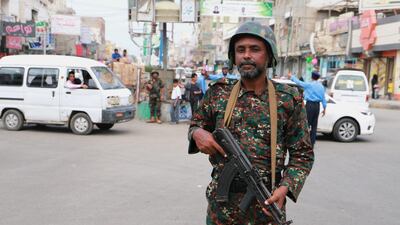Yemen’s internationally recognised government and Houthi rebels have agreed on the first phase of a withdrawal of troops from the port city of Hodeidah, seen as vital step towards ending the nearly-four year war.
"The parties reached an agreement on Phase 1 of the mutual redeployment of forces," a statement by the UN spokesman's office said on Sunday without giving details of exactly what the rebels and the government have agreed upon.
Meetings of the Regional Redeployment Committee (RCC), headed by Danish general Michael Lollesgaard, are seen as critical to building on the UN-brokered agreement reached in December.
Those negotiations in Sweden produced a ceasefire deal which included an agreement to withdraw troops from Hodeidah.
The UN hailed the development as an “important process” as part of efforts to end a war that has killed tens of thousands and left millions on the brink of starvation.
But the Houthi negotiating team has rejected the proposals made by Gen Lollesgaard and have yet to sign the deals official papers, the spokesman of Al Amalikah Brigades, Colonel Wathah Al Dubaish, told The National.
“The Houthis kept resisting the suggestions proposed by General Lollesgaard during the meeting until they received the green light from their commanders, while the government team was very cooperative," said Colonel Al Dubaish, who is supporting the RCC's government team.
The rebels had only provisionally agreed to the deal, he said, adding that he expects them to withdraw from the agreement.
Phase one of the deal stipulates that Houthi forces must withdraw from the ports of Hodeidah, Saleef and Ras Isa.
In phase two, coalition forces from the eastern outskirts of the city will also withdraw.
The next meeting is expected to convene within a week with the aim of finalising an agreement on phase two, the UN said in a statement.
Hodeidah, which has been under rebel control, is Yemen’s main entry point for desperately needed food, medicine, and other aid for starving and suffering civilians.
The fighting in the city have made it nearly impossible for humanitarian workers to offload aid and get it to those who need it.
Meanwhile, on the ground, 31 Houthi fighters have been killed in Yemen's mountainous northwestern Hajjah governorate since Friday, a military spokesman told The National on Sunday.
Among the casualties were six Houthi commanders, killed in an airstrike by the Arab coalition, a local journalist covering the battle said. "They were visiting fighters affiliated with them stationed in the bordering area between the province of Hajjah and the province of Amran," said Sa'ad Al Qaedi, speaking from from Hajjah.
One resident told The National that Houthis fighters had targeted areas populated by Hajoor tribesmen, in a bid to take control of the district.
"The Houthi troops which tried to advance towards the Hajoor area shelled the residences of the tribesmen using artillery," said Lutf, who asked that his full name not be used. "Killing dozens of people mostly children and women, some died because they were left bleeding...it was too difficult to take the wounded ones to the hospital which is far in the centre of Hajja."
A lack of medical services compounded an already dire situation, Luft said.
The Yemeni minister of the Local Administration Aburaqeeb Fateh called on Humanitarian Coordinator for Yemen Lise Grande to put pressure on Houthi rebels to lift the siege on the Hajoor tribes and on aid agencies to transfer food supplies, Yemen news agency reported on Sunday.

